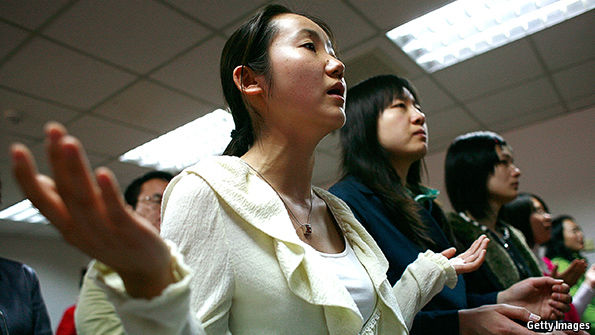“In the end, it doesn’t matter if there is more persecution or less,” says Jin Mingri, Zion’s founding pastor. “When times are good, there are more followers, and when times are bad, there are different opportunities for the church and the fellowship grows as well.”
House churches
Underground, overground
Despite harassment by police, China’s house-church movement is growing
The Economist | 9 April 2016

FOR the past couple of years, China’s tens of millions of Christians, most of whom are Protestants, have been watching events in the coastal province of Zhejiang with anxiety. The authorities there have been waging a relentless campaign to remove the large crosses that adorn the roofs of many churches; hundreds have been taken down, to the horror of their congregations. In January this took a turn for the worse with the arrest of Gu Yuese, the outspoken pastor of the country’s largest church, a colossal edifice in the provincial capital, Hangzhou, that seats 5,000 people—about 50% more than St Paul’s Cathedral in London. Many feared that the detention of Mr Gu, who had been criticising the removal of crosses, might signal the start of a fiercer, nationwide, crackdown.
To their relief, Mr Gu was released a few days ago. It was also a surprise. Only in February the pastor of another state-approved church in Zhejiang had been jailed for 14 years and his wife for 12 years after they protested against the removal of crosses. Mr Gu may owe his freedom to his church’s high profile in such a large and important city, rather than to any change of heart by Zhejiang’s authorities. Christians in the province, which has a high concentration of them, are not yet rejoicing.
But there is little sign that Zhejiang’s clampdown on the public flaunting of Christian faith, of which the crosses are seen as an example, is encouraging officials elsewhere to adopt a similar approach. Indeed in some areas, including Beijing, “house churches”, as those without official approval are often called (even though they sometimes meet in offices), have been operating ever more openly.
That is not to say that most Chinese Christians enjoy religious freedom. Far from it. Police in some areas continue to harass and detain members of house churches. But in many places, house churches are flourishing, and often make little if any effort to hide their activities from the government. Officials appear to turn a blind eye. President Xi Jinping is waging a fierce campaign against dissent, rounding up hundreds of civil-rights activists and tightening controls on the media. He appears less keen, however, to take on the country’s fast-growing Christian community, as long as its members do not openly defy the Communist Party.
In central Beijing, one house church meets in the basement of an apartment building. Its rented rooms include a high-ceilinged hall; another is used as a nursery. Underground it may be, but it is far from clandestine. A large red cross in a ground-level window advertises its presence. Posters of Bible verses inside the building are visible from the outside. “We are not exactly lying low,” says one church leader. “We sing hymns so loudly that people in the community get curious and come down to see what’s going on. Anyone is welcome.”
Under their noses a believer may be
Many are drawn to house churches because they resent the control exerted by the party over officially approved ones. The appointment of pastors has to be vetted by the government. They cannot preach to people under 18. They cannot declare allegiance to any particular branch of Protestantism. As one young man puts it: “The Chinese government is not my boss. God is my only leader.” But most house churches take precautions. When talking to foreign journalists, their leaders often ask not to be named. Some say they avoid preaching about issues relating to politics and social problems. To avoid drawing unwanted attention from officials (and getting too cramped) they try not to let their congregations grow larger than a few hundred members. Those that do often split up into separate churches.
In Beijing, members of unregistered churches are usually younger than 40. Brent Fulton of ChinaSource, a Christian NGO in America, says that many of the house churches that operate more openly were started in the 2000s by young people who had been members of informal Bible-study groups while they were at university. Such believers tend to see their faith as involving more than just private prayer, he says. Some are involved in charity work. A few even try to recruit new members through social media and websites, despite a ban on proselytising.
The government is expected soon to convene a policy-setting meeting on religion, its first in a decade. Observers are unsure whether this will result in a tightening of regulations on house churches, or possibly even a relaxation. Unusually, some senior officials have made contact with house-church leaders in recent months to discuss their work. This has given optimists some hope.
In the meantime, house churches continue to grow. In Beijing, one of the most prominent of them, called Zion Church (pictured), is so big that the house-church label seems wildly inappropriate. When it was founded in 2007 the congregation met in a small office in a commercial building. Since 2013 it has been using an entire floor of it. Some 1,500 people attend services each weekend. Hundreds of others are members of five associated churches scattered across the city. The main venue has a large auditorium with rows of plush blue chairs, children’s play areas and numerous meeting rooms of various sizes. It even has a coffee shop and gift store.
“In the end, it doesn’t matter if there is more persecution or less,” says Jin Mingri, Zion’s founding pastor. “When times are good, there are more followers, and when times are bad, there are different opportunities for the church and the fellowship grows as well.”


No comments:
Post a Comment